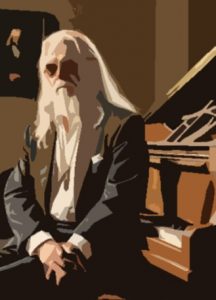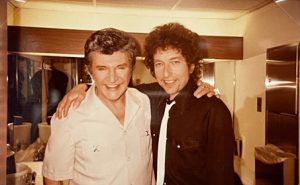My Own Version Of You (2020) part 10
by Jochen Markhorst
X And then see if you can make it make sense
I’m gonna make you play the piano like Leon Russell Like Liberace - like St. John the Apostle Play every number that I can play I’ll see you baby on Judgement Day
 “I’m absolutely convinced that people essentially see what they’re hearing,” says Stephen Sondheim, one of the most successful musical composers and lyricists of the twentieth century (Follies, Sunday in the Park with George, Sweeney Todd). That’s why he loves rhymes that don’t seem to rhyme visually, on paper. Rougher, for example, he explains, you can rhyme it with tougher. But if you use suffer instead, “you really engage the listener”;
“I’m absolutely convinced that people essentially see what they’re hearing,” says Stephen Sondheim, one of the most successful musical composers and lyricists of the twentieth century (Follies, Sunday in the Park with George, Sweeney Todd). That’s why he loves rhymes that don’t seem to rhyme visually, on paper. Rougher, for example, he explains, you can rhyme it with tougher. But if you use suffer instead, “you really engage the listener”;
Brown: Yes. So, I’m hearing rougher and suffer rhyme, but I’m… and then I quickly think…
Sondheim: And you think… and that’s a surprise. I have got a rhyme in “Passion,” colonel and journal. Now, you look at them on paper, they seem to have no relation to each other at all. So, when you rhyme them, it’s, ooh, you know? It’s – it – I really may be wrong about this. It’s just something that has struck me over the years.
(interview with Jeffrey Brown for PBS News Hour, December 2010)
Very recognisable and comparable to that other great, Lorenz Hart, and his passion for “outrageous rhymes”, as he himself calls them, which sometimes had to be reined in by his inseparable partner Richard Rodgers. Take “Mountain Greenery” from The Garrick Gaieties (1926), their first success, when Lorenz was still young but no less frenzied than he would remain for the rest of his career:
We could find no cleaner re- Treat from life's machinery Than our mountain greenery home
In the previous verse, Hart rhymes keener re-(ception) / beanery / greenery (“where God paints the scenery”), and elsewhere we encounter extravagances such as life its tone / Heifetz tone and map her own / chaperone, and a quatrain that almost collapses under its own linguistic and rhyming delight:
Simple cooking means More than French Cuisines I've a banquet planned which is Sandwiches and beans
Or Tim Rice, the lyricist for giants such as Andrew Lloyd Webber (Evita, Jesus Christ Superstar) and Elton John (The Lion King, 1994). In 1999, Rice wrote his autobiography Oh, what a circus, and with reserved pride, he pauses in almost every chapter to reflect on a successful rhyming discovery:
“While purists (and I now count myself as one) would shudder, no one was anything but delighted with the couplets as they flowed from my portable typewriter. ‘Biscuit’ and ‘district’ always hit the button laugh-wise, but is of course an inaccurate rhyme. […] When I have tried to correct rhymes for subsequent professional productions, the directors and singers involved always refused to accept the changes, saying they had always loved the original. I am stuck with ‘biscuit’ and ‘district’.”
Dylan instantly would recognise it, this pure pleasure. “It’s mentally… mentally… it gives you a thrill,” he says when interviewer Paul Zollo (SongTalk, 1991) asks him if rhyming is fun. “It gives you a thrill to rhyme something you might think, well, that’s never been rhymed before.” And besides just enjoying it, Dylan also recognises the necessity: “The rhyming and rhythm, what I call the mathematics of a song,” he analyses in 1965 (Margaret Steen interview for The Toronto Star Weekly), in the same years that he consistently refers to his songs as “mathematical music” in almost every interview.
This pure fun, the thrill of finding a rhyme that has never been used before, has not diminished in 2020:
I’m gonna make you play the piano like Leon Russell Like Liberace - like St. John the Apostle
… the frenzy to rhyme the Apostle with Leon Russell is indeed one in the category of “well, that’s never been rhymed before”. Even Tim Rice never got further than apostle / gospel (in Jesus Christ Superstar, of course), an obvious rhyme that is chosen nine times out of ten by songwriters who feature an apostle. Dylan only has competition from surprising outsiders: Billy Idol, of all people, sings and rhymes colossal with apostle (“Rita Hayworth”, 2021), Blondie’s Debby Harry sings while dancing Do the dark apostle / Do the sidewalk hustle (“Do The Dark”, 1980), and closest to Dylan’s outrageousness is a slightly less surprising outsider, R.E.M.’s eccentric frontman Michael Stipe in the chorus of the opening track of the comeback album Accelerate, in the furious “Living Well Is The Best Revenge” (2008):
All your sad and lost apostles Hum my name and flare their nostrils
“You get the rhymes first,” Dylan says in the same interview with Paul Zollo, “and work back and then see if you can make it make sense in another kind of way.” And that seems to have been the mechanism here, in this fifth verse of “My Own Version Of You”. Dylan has that crazy rhyme Leon Russell / the Apostle up his sleeve, and sees if he “can make it make sense”. Well, he has a narrator who creates an entity, an entity that produces music… Leon Russell plays the piano. Alright, the creature plays the piano like Leon Russell, like John the Apostle, and who else would fit in between?
Liberace has been floating around somewhere in the shadowy corners of Dylan’s creative mind for more than half a century. Opposites attract, apparently. The über-flashy bird of paradise, whose exceptional piano talent is overshadowed by glitter, fur coats and an uncanny toothpaste smile, really would seem to be Dylan’s incarnate allergy, but he is certainly not. Remarkably, Dylan talks about Liberace with apparent sympathy and without irony. He poses willingly and charmingly when the two happen to meet on the David Letterman Show on 22 March 1984 (Dylan performs with The Plugz, Liberace gives a cooking demonstration). In Dylan’s inimitable prose explosion Tarantula (written in 1964/65), Liberace is alpha and omega – Dylan incorporates “liberace” both in the first chapter Guns, the Falcon’s Mouthhook & Gashcat Unpunished (“save the clean, the minorities & liberace’s countryside”) as in the last chapter AI Aaraaf & the Forcing Committee: “the sight of george raft-richard nixon-liberace-d.h. lawrence & pablo casals-all the same person.” And when interviewer Bob Fass (WBAI Interview, 1966) tries to provoke Dylan into a taunt, Dylan doesn’t budge:
Fass: Well, people call up and ask us to play old Mario Lanza records. Somebody called up and asked me to play some Liberace tonight. Dylan: Oh, that’s fine. Fass: Yeah? Dylan: Yeah. […]You know, I met him one time. He smiled.
So if he in 2020 is looking for a musician who can serve as a model for his creature’s skills, the talented Liberace is a respectful choice. That, and because Li-be-ra-ce has the same rhythm as Le-on-Ru-ssell and the-A-pos-tle, of course. And we put him at the beginning of the second line, in the middle of the unlikely trio, because finding a rhyming word for Liberace is even more difficult than for Apostle. Well, finding a rhyming word might still be possible – Liberace loves an Apache from Karachi playing a mariachi or something like that, at most – but then again: see if you can make that make sense.
To be continued. Next up My Own Version Of You part 11: Just extending the line
Jochen is a regular reviewer of Dylan’s work on Untold. His books, in English, Dutch and German, are available via Amazon both in paperback and on Kindle: 
- Blood on the Tracks: Dylan’s Masterpiece in Blue
- Blonde On Blonde: Bob Dylan’s mercurial masterpiece
- Where Are You Tonight? Bob Dylan’s hushed-up classic from 1978
- Desolation Row: Bob Dylan’s poetic letter from 1965
- Basement Tapes: Bob Dylan’s Summer of 1967
- Mississippi: Bob Dylan’s midlife masterpiece
- Bob Dylan’s Greatest Hits
- John Wesley Harding: Bob Dylan meets Kafka in Nashville
- Tombstone Blues b/w Jet Pilot: Dylan’s lookin’ for the fuse
- Street-Legal: Bob Dylan’s unpolished gem from 1978
- Bringing It All Back Home: Bob Dylan’s 2nd Big Bang
- Time Out Of Mind: The Rising of an Old Master
- Crossing The Rubicon: Dylan’s latter-day classic
- Nashville Skyline: Bob Dylan’s other type of music
- Nick Drake’s River Man: A very British Masterpiece
- I Contain Multitudes: Bob Dylan’s Account of the Long Strange Trip
- Bob Dylan’s Rough And Rowdy Ways – Side B
- Bob Dylan’s High Water (for Charley Patton)
- Bob Dylan’s 1971
- Like A Rolling Stone b/w Gates Of Eden: Bob Dylan kicks open the door
- It Takes A Lot To Laugh, It Takes A Train To Cry b/w Just Like Tom Thumb’s Blues – Bob Dylan’s melancholy blues

